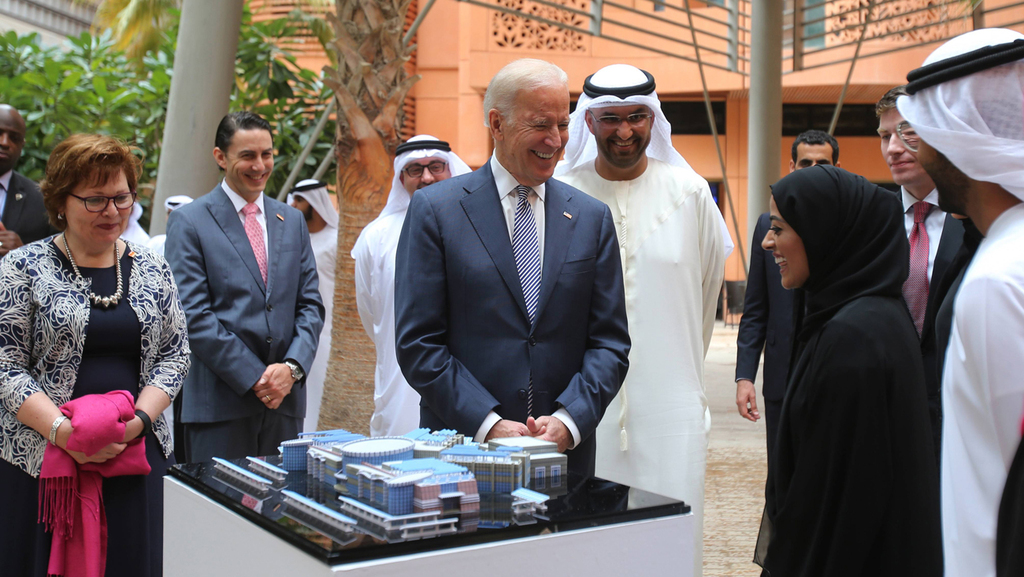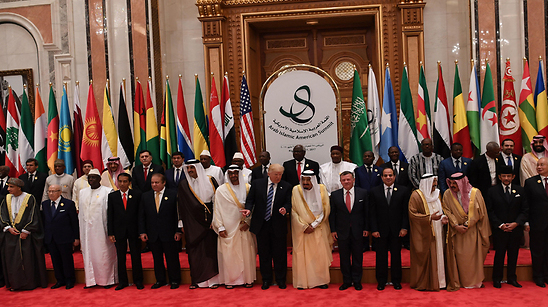When U.S. President-elect Joe Biden takes office on January 20, Gulf security will be among the most important issues that his administration will have to deal with.
Biden is no stranger to this issue, having been involved in it as vice-president during the Obama era and prior to that. The new president spent 35 years in the Senate, during which he served as a prominent member and occasional chair of the Foreign Relations Committee, one of the most important committees in the Senate, in which Gulf security has occupied an important position over the past decades.
3 View gallery


President-elect Joe Biden in the UAE in 2016, during his term as vice president
(Photo: AP)
Biden’s election marks a return to the traditional course of U.S. policy, in terms and style, after the term of Donald Trump, who came from outside the traditional establishment that dominates Washington.
Biden represents stability and has good relations with leaders of both the Democratic and Republican parties.
There is bipartisan consensus among American policymakers that the security of the Gulf is paramount to U.S. national security. Despite the unusual personal style of President Trump, his administration relied heavily on the Gulf security architecture that was devised well before he took office in January 2017.
Since the Iranian Revolution of 1979, a security framework has been developed based on the need to secure international shipping routes and American strategic interests in the Arab Gulf.
This security framework confirms the central role played by the Gulf Cooperation Council in maintaining regional security. This framework has not changed much throughout the years, and Biden is not expected to change it either — unless Iran’s behavior changes drastically.
Gulf countries and the United States maintained close ties ever since the establishment of the Gulf Cooperation Council in May 1981. During the war to liberate Kuwait, America relied heavily on the Cooperation Council, which played a pivotal role in the Gulf War.
3 View gallery


Anti-government demonstrations in Bahrain in 2011, during the Arab Spring
(Photo: AP)
Amid the events of the Arab Spring and the tumultuous turmoil that led to the growing Iranian interference in the region, the two sides agreed to establish a Strategic Cooperation Forum that would facilitate even closer cooperation between the GCC and the U.S..
In March 2012, the founding meeting of the forum was held at the headquarters of the Cooperation Council in Riyadh, headed by the late Prince Saud al-Faisal and U.S. Secretary of State Hillary Clinton.
It was attended by foreign ministers and senior officials from the GCC countries and, on the American side, by a large delegation of administration officials.
Several working groups were formed and direct lines of communication were established between the two sides, through the General Secretariat of the Cooperation Council, the U.S. State Department and the National Security Council at the White House.
The forum paved the way for the first summit between the Cooperation Council and the United States, which was held in Camp David in May 2015. The second summit was held in Riyadh in April 2016, during the last year of the Obama presidency.
At the time, it was agreed to expand the scope of cooperation to include issues such as economic diversification and youth empowerment.
3 View gallery


Donald Trump attends the third Gulf-American summit in Saudi Arabia, 2017
(Photo: Getty Images)
In May 2017, the third Gulf-American summit was held under President Donald Trump, affirming the strong commitment to the Camp David Accords, while greatly expanding the scope of cooperation.
Therefore, there is an agreement among all political parties in the United States regarding the importance of the Gulf-American partnership. This does not mean that the American political system is rigid and that changes in policy don’t happen.
However, the fundamentals of the GCC-U.S. partnership are based on a deeply-rooted alliance that has only grown stronger each year. Both parties understand that the Gulf’s security provides stability of energy markets, strengthened trade and investment, and a calmer Middle East. Therefore, the American policy toward the Gulf will not change under Biden’s leadership.
Dr. Abdul Aziz Hamad Al-Oweishek is assistant secretary general for Political Affairs and Negotiations at the Gulf Cooperation Council
First published: 23:22, 12.04.20

